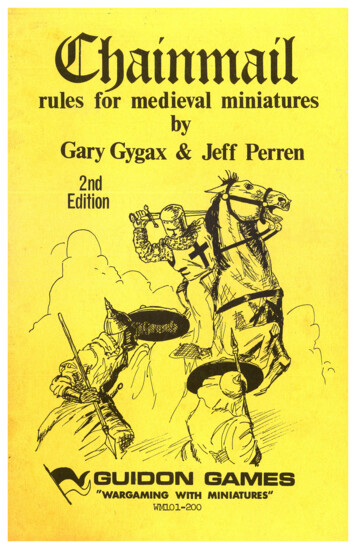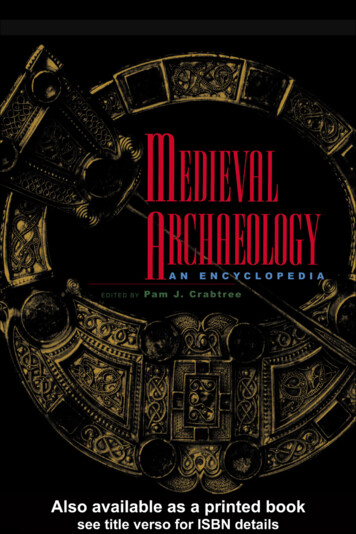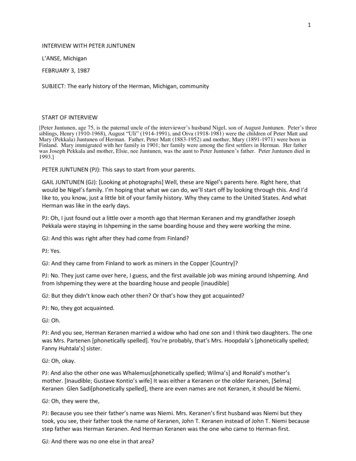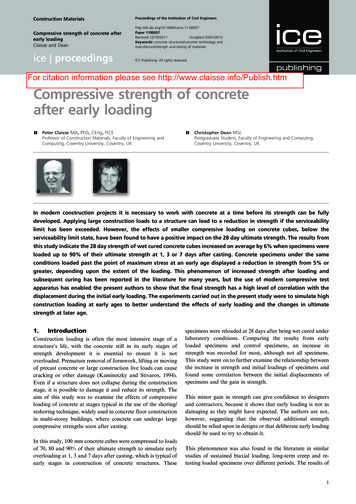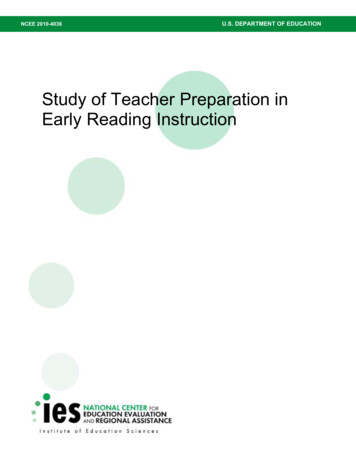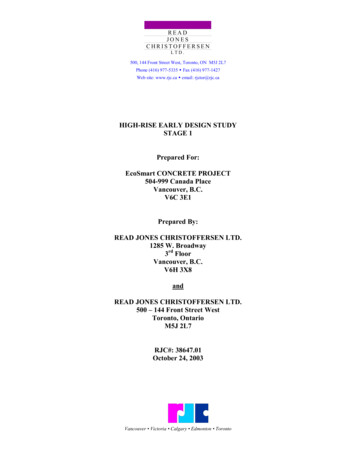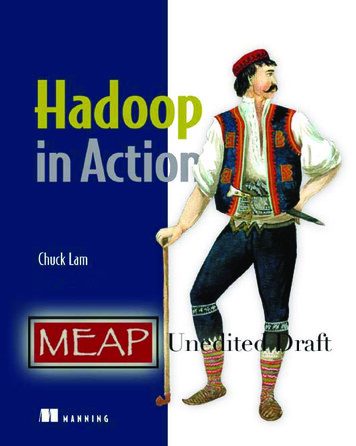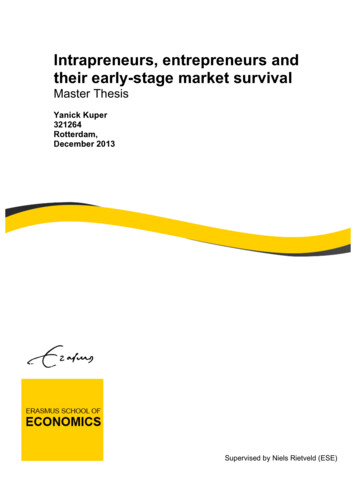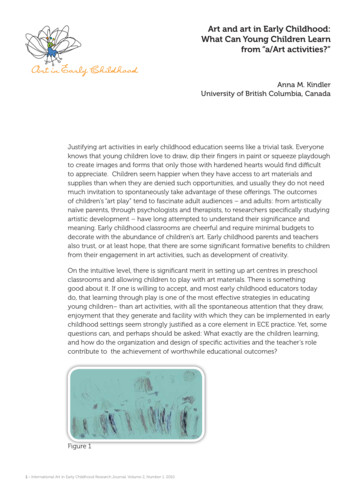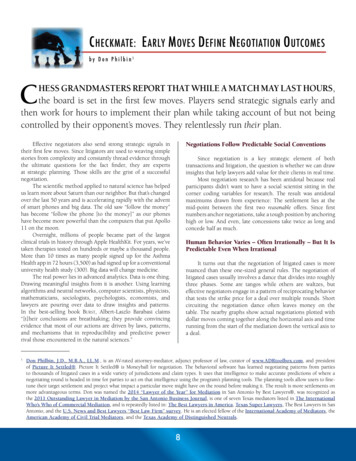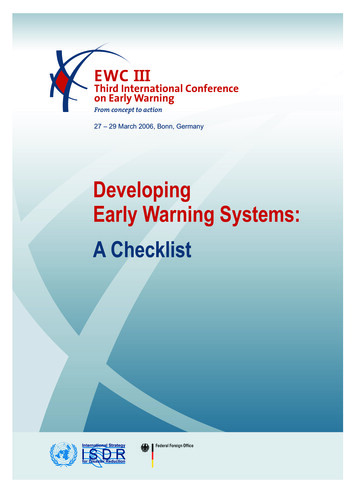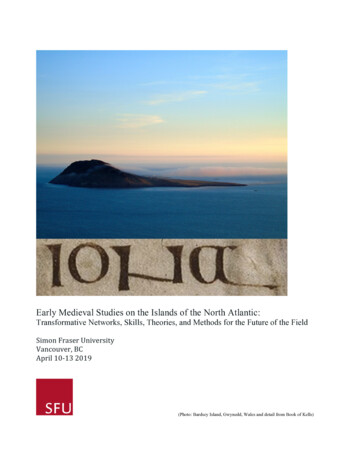
Transcription
Early Medieval Studies on the Islands of the North Atlantic:Transformative Networks, Skills, Theories, and Methods for the Future of the FieldSimon Fraser UniversityVancouver, BCApril 10-13 2019(Photo: Bardsey Island, Gwynedd, Wales and detail from Book of Kells)
SponsorsIONA Vancouver would not be possible without a Canadian Social SciencesHumanities Research Council Connections Grant, and the generous supportof the following Simon Fraser University units: Department of English,Faculty of Arts and Social Sciences, the Office of the Vice PresidentAcademic, Department of Humanities, Institute for the Humanities,Department of History, and Department of World Literature. From outsideSFU we received support from the University of Denver, University ofBritish Columbia Department of English, University of British ColumbiaOkanagan Faculty of Critical and Creative Studies, and University ofToronto Department of English. Thanks very much to them all.2
Table of ContentsSponsors 2Contents 3Welcome 4Territorial Acknowledgement 4Acknowledgements 5Inclusivity Statement . 5Social Media Policy 5Venue Information . 6Maps 7-8Wifi Information . 9IONA website . 10The Future . 10Talks and Sessions . 11-30Local Recommendations 31-323
Welcometo IONA: Islands of the North Atlantic at Simon Fraser University. We lookforward to the three days of creativity, collaboration, thinking, and listening toimagine and build new methods, approaches, and networks for the study of theearly medieval cultures of the North Atlantic (and beyond). The IONA model andaims were pioneered by Donna Beth Ellard and Dan Remein at the Seafaringconference at the University of Denver, November 3-5, 2016. The conference isdesigned non-traditionally as a workspace where students, artists, critics, andscholars of the early medieval North Atlantic can work cooperatively,comparatively, and interdisciplinarily, challenging the boundaries that traditionallyencircle the academy. Seminars explore a topic across three days, often withprecirculated readings, allowing for a deeper, more holistic engagement in peerresearch than is typically offered by the traditional conference format. Labs try outan idea or method, aiming to test a new approach collaboratively and in a creativeenvironment. Workshops seek to teach and develop skills, often with hands-onpractice, offering participants opportunities to study topics unavailable at theirhome institutions due to lack of time or access. All registered conference attendeesmay take part in any of the sessions, and each session is run at the direction of thesession organizers. We encourage you to sample seminars, labs, and workshopsoutside your main interests. Each day is capped by a keynote speaker on one of theconference’s primary themes. We are fortunate to have Eldon Yellowhorn, ElaineTreharne, Nicola Griffith, and Abraham Anghik Ruben as keynote speakers. Thisiteration of IONA draws together three main threads, all engaging thedecolonization of early medieval studies in the university and in popular culture:denationalization, deperiodization and indigenization. And all the sessions seek todevelop skills, test limits, and make new connections. The sessions that compriseIONA Vancouver were all generated by you; from the proposal stage to theindividual sessions themselves, the organizers and participants (you!) have madethis happen, so our thanks go out to all of you here. We hope it is productive,useful, challenging, and energizing for all.-Matthew T. Hussey, Donna Beth Ellard, and Georgia HenleyTerritorial AcknowledgementWe respectfully acknowledge the Squamish (Sḵwx̱ wú7mesh Úxwumixw),Tsleil-Waututh (səl̓ ilw̓ ətaʔɬ), and Musqueam (xʷməθkʷəy̓ əm) Nations onwhose shared and unceded traditional territories SFU’s downtownVancouver campus stands.4
Thanksalso to Laura Walker, secretary to the chair, SFU-English; Maureen Curtin,Manager, SFU-English; and Beverly Neufeld, Research Grant Facilitator,SFU-Faculty of Arts and Social Sciences. We could not have done thiswithout them. Thanks to Judith Steedman and Evelyn Bartlett Hussey forgraphic design. And special thanks to the graduate student RAs: MarieHorgan was instrumental at the grant and conference planning stages, andshe, Alexander Cline and Elmira Bahrami Majd have been crucial throughthe preparations and conference itself.Inclusivity StatementIONA is committed to the presence and participation of all persons withrespect to age, bodies, abilities, ethnicities, sex, gender, gender identity andexpression, sexual orientations, status, nationality, race, religion,socioeconomic condition, or any other characteristic. Bias, discrimination,and exclusion only serve to harm people, and also to narrow and diminishmedieval studies. We welcome diverse participants and support the visibilityof such diversity, because we seek a more inclusive future for the field, theacademy, and our communities. This conference prioritizes a safe andaccountable space for all.Social Media PolicyPlease use #IONAVancouver. Respect presenters’ and presiders’ wishes inregards to all social media dissemination. Do not take photos or record videoor audio without express permission from presenters and presiders. Beaccurate in attributing words to presenters and faithful in reporting thosewords. Be sure to distinguish your own comments about a topic from thoseof a speaker or other participant. Tweet about others as you would haveothers tweet about you. Be respectful, generous, kind, constructive.We are hoping to archive the social media posts on IONA, so your input,ideas, and cooperation are very much appreciated.5
VenueThe conference is taking place at the Simon Fraser University campus atHarbour Centre in downtown Vancouver. The registration desk will be in themain entrance hall of Harbour Centre and the seminars, workshops, and labswill be held in five break-out rooms. Two of these rooms are on the mainfloor: 1510 (Tree Island Industries Conference Room) and 1520 (BarrickGold Lecture Room); three more are upstairs 2050 (Alan and Margaret EyreBoardroom), 2200 (RBC Dominion Securities Executive Meeting Room),and 2250 (Westcoast Energy Executive Meeting Room). Escalator at thecentre of the main floor, and elevator to the right (if facing the escalator),down corridor between registrar and computer lab. The plenaries will beheld in 1900, the Fletcher Challenge Theatre. Opening reception is in theWosk Centre for Dialogue, downstairs in the ICBC salons, across the streetand next door to the conference hotel, the Delta. Harbour Centre has genderlabeled washrooms left down the hall, left (if facing the escalator). There areuniversal gender washrooms (single stall) down the hall past the elevator.There is a child changing and feeding room on the second floor just downthe hall from the elevator (room 2180). There is a small branch of the SFUUniversity library at Harbour Centre, as well as Printing and Copyingservices next door. All conference rooms are equipped for AV presentations.Security stand near base of escalator, across from registration desk.6
7
8
SFU INTERNET ACCOUNT LOG INLW5080IONA2019!Your Computing ID:Your Password:To logon to wireless internet via your device:1) Choose SFUNET Network2) Once connected to SFUNET, open any webpage *3) Choose “I will install SFUNET‐SECURE at another time”, and click“Continue to sign in”4) Enter the SFU Computing ID and Password as noted above. Thepassword is case sensitive, and contains 8 characters5) Click “I have read and understood GP‐24”, and click “Sign in”You will now be connected to the SFUNET Network.* NOTE: You MUST open a webpage in order to enter the credentialsprovided above. Simply choosing “SFUNET” on your device and seeingthe check mark will NOT connect you to the internet. Once you open awebpage, you will be prompted to enter the ID and Password above.If you are experiencing issues connecting, please dial “11” for Meetings andEvents from an internal telephone for assistance.9
IONA websiteIONA has a new (and beautiful) website, put together by Donna Beth Ellard,with special thanks to the University of Denver. There you will findinformation about IONA’s activities, as well as published IONA-relateddocuments and an archive of several of the workshops and talks held here inVancouver. Content will be added and news posted.Please go to: ionaassociation.orgThe FutureWe are so very pleased to announce that this is not over. Josh Davies andClare Lees, co-sponsored by King's College London and the Institute ofEnglish Studies, School of Advanced Study, University of London, will beorganizing and hosting IONA in November of 2021 in London. The workthat began at Seafaring will continue. Please check the new website forinformation.10
Wednesday, April 10thOpening Talk and Reception 5:30-7:30pmJoseph and Rosalie Wosk Centre for Dialogue, ICBC SalonsSimon Fraser University580 West Hastings, Vancouver BCMatthew Hussey, English, Simon Fraser UniversityWelcome and IntroductionEldon Yellowhorn (Archaeology & First Nations Studies, Simon Fraser University),“Understanding Blackfoot Antiquity on the Northern Plains of North America duringthe Medieval Period"My research on the roots of Blackfoot culture on the northernplains disagrees fundamentally with narratives put forward byhistorians, whose accounts rely on the journals and diaries fromthe early fur trade era. My research also diverges from thediscourse of plains archaeologists whose emphasis on materialculture introduces the bias contained in their taxonomies ofprehistoric cultures. While I have read and contributed to thedocumentary record of the fur trade and while I am anarchaeologist, nevertheless my internalist perspective is my guidefor my work. My research on northern plains antiquitysynthesizes information from the archaeological record, oralnarratives and archaeoastronomy to provide a clearerunderstanding of the roots on Blackfoot culture. In this paper I discuss the oral narratives that shapedBlackfoot ideology and religious thought during the Medieval Warm Spell (c.900-1300 AD), whichis a recognized climatic phenomenon defined by a global warming event. I consider thearchaeological signature of stories associated with Blackfoot culture to demonstrate their presence onthe northern plains in the early Medieval Period (c.500 AD) and earlier.Thursday, April 11thRegistration and Coffee 8:00 - 9:00amSessions 8:30 - 10:30amThe Contemporary Medieval: Critical and Creative Methods, Practices, andEnvironments 1 (Seminar)Harbour Centre 1520Organizers: Joshua Davies (King's College London), Clare A. Lees (School ofAdvanced Studies, University of London), Gillian R. Overing (Wake Forest11
University)We want these sessions to constitute a sustaining and inclusive, reflective and exciting seminar thatenables all core participants to explore our current work-in-progress and to develop ideas about thecontemporary medieval.We think the best way to achieve this is to take collective responsibility for our work over thethree days that we meet, thereby avoiding the pitfalls of the three papers/proposals per session andchair of more usual seminar and conference structures. As we are scheduled to meet 8:30-10:30 eachmorning, this is perhaps just as well! We would, in short, like this to be a properly shared seminarand we are not convinced we need chairs to help us do this. So we list all core participants for eachseminar.In order to facilitate our working over the three days, each core participant will prepare ashort position paper, set of questions, quotations or extracts from a text or texts, image/images (max500 words, could be less) in advance of our seminar that speaks both to our individual work and tothe contemporary medieval. We will circulate these in advance of IONA. Over the course of theseminar participants are invited to speak to the subject of their submitted paper and respond to ourevolving discussions.We will do the same thing and we will use our three contributions in the first meeting to setup the seminar, clarify expectations and aims, and set out issues.We ask that anyone who wishes to attend these seminars email Josh Davies(Joshua.davies@kcl.ac.uk) at the earliest opportunity.Clare, Gillian and JoshDay 1: Performance, Race and EnvironmentJosh Davies, ‘Anglo-Saxon Environments’Clare Lees, ‘Communities of Attention: Practice, Audience, Gender’Gillian Overing, ‘American/Medieval: Emergence, Divergence, Collaboration’James L. Smith (Trinity College, Dublin)From Fibre to Decorated Textiles in the Early North Atlantic: Making, Methods,Meanings 1 (Workshop/Seminar)Harbour Centre 1510Organizer: Alexandra Makin (Independent Scholar)From fibre to decorated textiles in the Early North Atlantic: making, methods, and meanings is aunique interdisciplinary and experimental session that will run throughout the IONA conference. Thefirst slot brings together teachers, artists and researchers who make and decorate textiles using earlymedieval techniques. Participants will have an opportunity to take part in two 45-minute taster orshow-and-tell sessions, covering skills from weaving and embroidery to making fish leather. Thesecond and third sessions will bring together papers from practitioners, students and establishedscholars. Their focus is the interpretation of early medieval textiles and identity in the North Atlanticfrom archaeological evidence, experimental work and literary sources. A second strand willexplore how surviving practical skills can be kept alive and passed on to others. The final session willclose with a round table discussion where participants are invited to contribute their insights ofmaking through prac
Matthew Hussey, English, Simon Fraser University Welcome and Introduction Eldon Yellowhorn (Archaeology & First Nations Studies, Simon Fraser University), “Understanding Blackfoot Antiquity on the Northern Plains of North America during the Medieval Period" My research on the roots of Blackfoot culture on the northern plains disagrees fundamentally with narratives put forward by historians .
